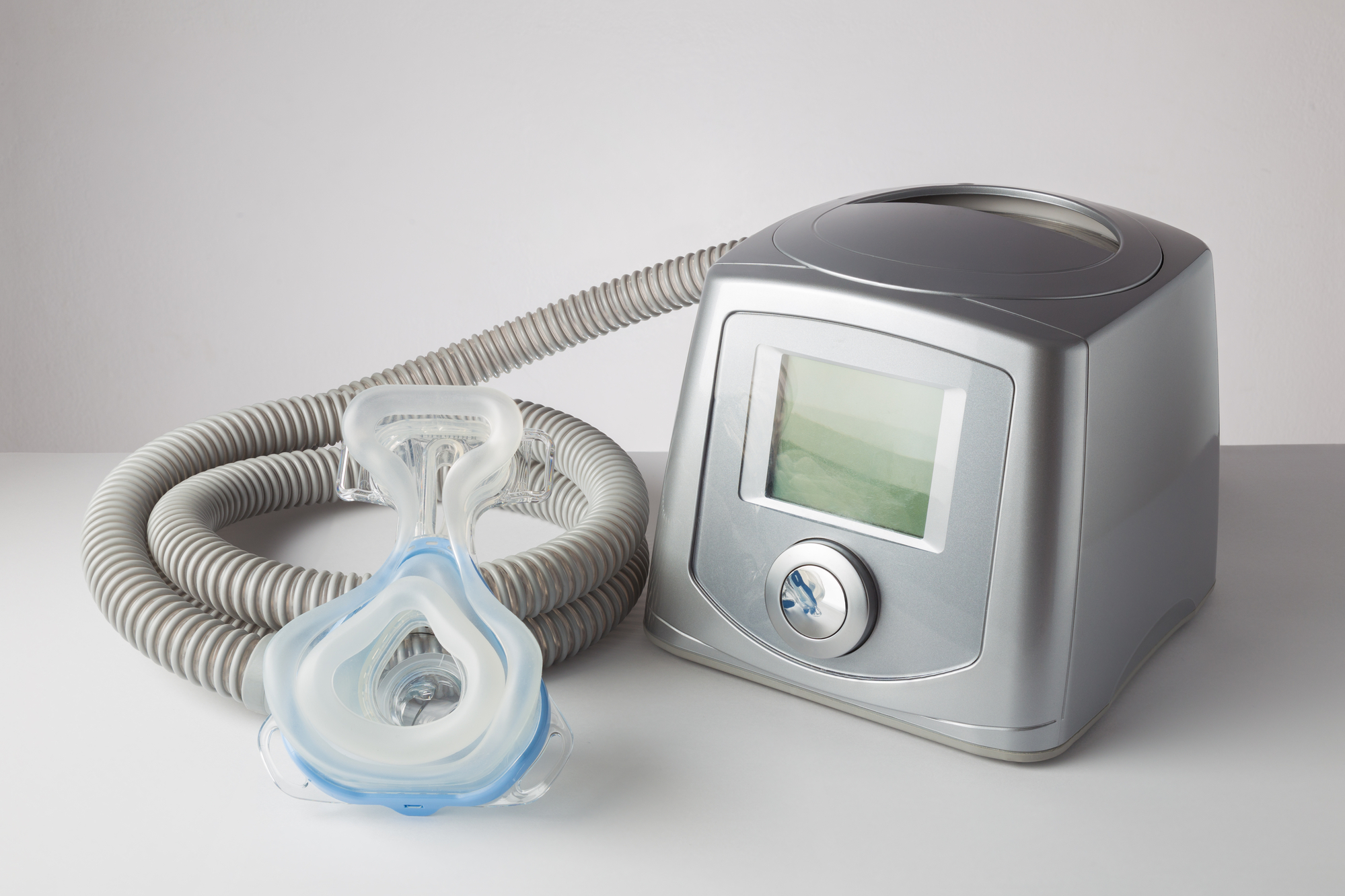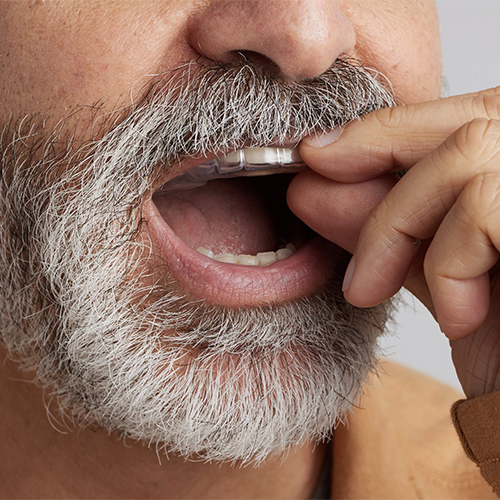Sleep Apnea 101
What Is a CPAP/BiPAP/APAP Machine?
Know the Difference, Then Discover the Comfortable Alternative
If you’ve recently been diagnosed with sleep apnea, you’ve probably come across terms like CPAP, BiPAP, and APAP. These devices fall under a category called Positive Airway Pressure (PAP) therapy, and they are widely used in the treatment of sleep-disordered breathing.
While North Florida Sleep specializes in custom oral appliance therapy, we believe it’s important for patients to understand all available treatment options so they can make informed decisions in consultation with their sleep specialist.
What Is Positive Airway Pressure (PAP) Therapy?
Positive Airway Pressure (PAP) therapy is a category of treatments used to manage obstructive sleep apnea (OSA) and other sleep-related breathing disorders. The goal of PAP therapy is simple: to keep your airway open while you sleep by delivering pressurized air through a mask.
When your airway collapses or becomes blocked during sleep, it can cause breathing pauses, loud snoring, and disrupted rest. PAP devices prevent this by gently forcing air into your airway to keep it open—so you can breathe continuously throughout the night.
There are several types of PAP therapy:
- CPAP (Continuous Positive Airway Pressure): Delivers one consistent air pressure level all night.
- BiPAP (Bilevel Positive Airway Pressure): Offers two pressure levels—one for inhaling and one for exhaling.
- APAP (Automatic Positive Airway Pressure): Adjusts pressure automatically based on your breathing patterns.
PAP therapy is considered the gold standard for treating moderate to severe sleep apnea, and it’s highly effective when used consistently.
So Why Do Some Patients Look for Alternatives?
While PAP therapy works well for many people, some patients find it difficult to adjust to the airflow, noise, or discomfort of wearing a mask each night. That’s where custom oral appliance therapy comes in—as a quieter, easier-to-use solution for mild to moderate sleep apnea.
What Is a Positive Airway Pressure (PAP) Machine?
Positive Airway Pressure (PAP) machines are commonly prescribed to treat sleep apnea. These devices work by delivering pressurized air through a mask while you sleep, helping to keep your airway open and prevent interruptions in breathing.
There are several types of PAP machines, each designed to meet different needs depending on the type and severity of your sleep apnea:
- CPAP (Continuous Positive Airway Pressure): Delivers one consistent air pressure level all night.
- BiPAP (Bilevel Positive Airway Pressure): Offers two pressure levels—one for inhaling and one for exhaling.
- APAP (Automatic Positive Airway Pressure): Adjusts pressure automatically based on your breathing patterns.
While PAP therapy is considered the gold standard for treating moderate to severe sleep apnea, some patients find it difficult to adjust to the mask, airflow, or noise. For those with mild to moderate obstructive sleep apnea, a custom oral appliance may be a more comfortable and travel-friendly alternative.

What Is a CPAP Machine?
CPAP stands for Continuous Positive Airway Pressure. It’s the most commonly prescribed device for obstructive sleep apnea. A CPAP machine delivers a steady stream of pressurized air through a mask to keep your airway open during sleep.
CPAP at a Glance:
- ✅ Effective for moderate to severe obstructive sleep apnea
- ⚠️ Requires wearing a mask attached to tubing
- ⚠️ Some users find it noisy or difficult to tolerate
How It compares to Oral Appliance Therapy:
While CPAP is highly effective, many patients struggle with comfort or adherence. For those with mild to moderate OSA, a custom oral appliance can be a quieter, more comfortable alternative without masks or machines.
What Is a BiPAP Machine?
BiPAP (Bilevel Positive Airway Pressure) machines deliver two levels of pressure: a higher one during inhalation and a lower one during exhalation. These are often prescribed when CPAP therapy isn’t well tolerated or for patients with more complex breathing conditions like central sleep apnea or COPD.
BiPAP at a Glance:
- ✅ Easier to exhale than with CPAP
- ✅ Often used in more complex cases
- ⚠️ More expensive and more complex setup
How It compares to Oral Appliance Therapy:
BiPAP may be necessary for certain medical conditions. However, for patients without central apnea or complex respiratory issues, a custom oral appliance is a non-invasive alternative that’s easier to travel with and doesn’t require electricity.
What Is an APAP Machine?
APAP stands for Automatic Positive Airway Pressure. These machines adjust pressure automatically throughout the night based on your breathing patterns.
APAP at a Glance:
- ✅ Personalized airflow for changing sleep conditions
- ✅ Often preferred by new users for comfort
- ⚠️ May still involve mask discomfort and tubing issues
How It compares to Oral Appliance Therapy:
Both APAP and custom oral appliances offer a more personalized experience than fixed-pressure CPAP. However, oral appliances provide that comfort without airflow, noise, or mask-related discomfort, making them an appealing alternative for many patients.
How Do CPAP, BiPAP, and APAP Machines Compare?
All three devices are designed to treat sleep apnea by keeping your airway open while you sleep—but they differ in how they deliver air pressure and who they’re best suited for.
- CPAP (Continuous Positive Airway Pressure):
Delivers a steady, fixed level of air pressure throughout the night. It’s the most commonly prescribed device and works well for patients with moderate to severe obstructive sleep apnea. Some users, however, find the constant pressure or mask uncomfortable. - BiPAP (Bilevel Positive Airway Pressure):
Offers two different pressure levels—one for inhaling, and a lower one for exhaling. This makes breathing more comfortable for people who struggle with CPAP. It’s often used in more complex cases like central sleep apnea or respiratory conditions. - APAP (Automatic Positive Airway Pressure):
Continuously monitors your breathing and automatically adjusts the pressure as needed. This flexible approach is often more comfortable for new users or for those whose pressure needs change throughout the night.
While each machine has its advantages, they also require nightly use of a mask and tubing—something many patients find difficult to maintain. That’s why some individuals with mild to moderate obstructive sleep apnea explore oral appliance therapy as a simpler, more comfortable alternative.
Challenges of Using CPAP, BiPAP, and APAP Machines
While PAP machines can be highly effective for treating sleep apnea, they’re not always the right fit for every patient. Many people find the day-to-day experience of using these machines inconvenient, uncomfortable, or disruptive to their sleep routine.
If you’ve experienced any of these challenges, you’re not alone. Many people turn to custom oral appliance therapy as a simpler, more comfortable solution for treating mild to moderate obstructive sleep apnea.
Here are some of the common challenges patients report:
😣 Discomfort From the Mask
Many patients find the mask bulky, tight, or difficult to sleep with—especially if they tend to sleep on their side or stomach. The straps can leave marks, and the sensation can interfere with falling or staying asleep.
🔊 Noise Disruption
Even the quietest machines can produce enough noise to bother light sleepers or their partners. For those sensitive to sound, this added disruption may defeat the purpose of sleep therapy.
💨 Dryness or Nasal Congestion
Pressurized airflow can lead to dry mouth, sore throat, or nasal congestion. While humidifiers are available, not everyone finds relief from these side effects.
🔌 Limited Portability
Traveling with a PAP machine often requires extra planning—outlets, power converters, or FAA-approved devices. For patients on the go, this added hassle can lead to skipped treatments.
😐 Adjustment Period
It can take weeks or even months to fully adjust to using a CPAP, BiPAP, or APAP machine. Some patients never adapt and may stop therapy altogether, putting their health at risk.
Why North Florida Sleep Focuses on Oral Appliance Therapy
At North Florida Sleep, we focus exclusively on custom oral appliances as a comfortable, effective, and travel-friendly option for patients with mild to moderate obstructive sleep apnea or chronic snoring.
Many patients come to us after struggling with CPAP compliance, looking for a simpler solution. Our oral appliances are:
- 🛌 Quiet and discreet
- ✈️ Easy to travel with
- 😌 Comfortable and custom-fit
- 📈 Proven effective for many sleep apnea patients
 ProSomnus® Sleep and Snore Device
ProSomnus® Sleep and Snore Device
Curious if an Oral Appliance Could Work for You?
If you’re exploring sleep apnea treatment options—or if you’ve tried CPAP but can’t stick with it—a custom oral appliance may be just what you need.
Schedule a consultation with our team at North Florida Sleep to learn whether oral appliance therapy is right for you.
Contact us
Call us
Location
1700 Eagle Harbor Pkwy, Suite 7
Fleming Island, FL 32003
Hours
Monday 9am- 4pm
Tuesday 9am- 4pm
Wednesday 10am - 5pm
Thursday 9am- 4pm
Friday By Appointment
Saturday Closed
Sunday Closed